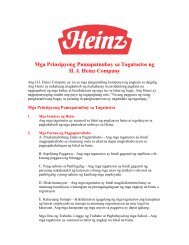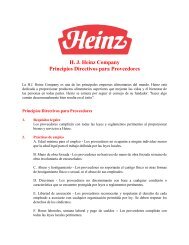Download Annual Report PDF - Heinz
Download Annual Report PDF - Heinz
Download Annual Report PDF - Heinz
You also want an ePaper? Increase the reach of your titles
YUMPU automatically turns print PDFs into web optimized ePapers that Google loves.
H. J. <strong>Heinz</strong> Company and Subsidiaries<br />
Notes to Consolidated Financial Statements — (Continued)<br />
effectively closed down the unregulated parallel market, which existed for exchanging VEF for<br />
U.S. dollars through securities transactions. Our Venezuelan subsidiary has no recent history of<br />
entering into exchange transactions in this parallel market.<br />
The Company uses the official exchange rate to translate the financial statements of its<br />
Venezuelan subsidiary, since we expect to obtain U.S. dollars at the official rate for future<br />
dividend remittances. The official exchange rate in Venezuela had been fixed at 2.15 VEF to 1<br />
U.S. dollar for several years, despite significant inflation. On January 8, 2010, the Venezuelan<br />
government announced the devaluation of its currency relative to the U.S. dollar. The official<br />
exchange rate for imported goods classified as essential, such as food and medicine, changed from<br />
2.15 to 2.60, while payments for other non-essential goods moved to an exchange rate of 4.30.<br />
Effective January 1, 2011, the Venezuelan government eliminated the 2.60 exchange rate for<br />
essential goods leaving one flat official exchange rate of 4.30.<br />
The majority, if not all, of our imported products in Venezuela fell into the essential classification<br />
and qualified for the 2.60 exchange rate. The elimination of the 2.60 rate had an immaterial<br />
unfavorable impact on the Company’s cost of imported goods, capital spending and the payment<br />
of U.S. dollar-denominated payables to suppliers recorded as of January 1, 2011 in Venezuela. Also,<br />
since our Venezuelan subsidiary’s financial statements are remeasured using the 4.30 rate, as this is<br />
the rate expected to be applicable to dividend repatriations, the elimination of the 2.60 rate had no<br />
impact relative to this remeasurement. As of April 27, 2011, the amount of VEF pending government<br />
approval to be used for dividend repatriations is $27.9 million at the 4.30 rate, of which $8.5 million<br />
has been pending government approval since September 2008 and $19.4 million since<br />
November 2009.<br />
During Fiscal 2010, the Company recorded a $61.7 million currency translation loss as a result of<br />
the currency devaluation, which had been reflected as a component of accumulated other<br />
comprehensive loss within unrealized translation adjustment. The net asset position of our<br />
Venezuelan subsidiary has also been reduced as a result of the devaluation to approximately<br />
$106.7 million at April 27, 2011.<br />
Highly Inflationary Economy<br />
An economy is considered highly inflationary under U.S. GAAP if the cumulative inflation rate<br />
for a three-year period meets or exceeds 100 percent. Based on the blended National Consumer Price<br />
Index, the Venezuelan economy exceeded the three-year cumulative inflation rate of 100 percent<br />
during the third quarter of Fiscal 2010. As a result, the financial statements of our Venezuelan<br />
subsidiary have been consolidated and reported under highly inflationary accounting rules<br />
beginning on January 28, 2010, the first day of our Fiscal 2010 fourth quarter. Under highly<br />
inflationary accounting, the financial statements of our Venezuelan subsidiary are remeasured<br />
into the Company’s reporting currency (U.S. dollars) and exchange gains and losses from the<br />
remeasurement of monetary assets and liabilities are reflected in current earnings, rather than<br />
accumulated other comprehensive loss on the balance sheet, until such time as the economy is no<br />
longer considered highly inflationary.<br />
The impact of applying highly inflationary accounting for Venezuela on our consolidated<br />
financial statements is dependent upon movements in the applicable exchange rates (at this<br />
time, the official rate) between the local currency and the U.S. dollar and the amount of<br />
monetary assets and liabilities included in our subsidiary’s balance sheet. At April 27, 2011, the<br />
U.S. dollar value of monetary assets, net of monetary liabilities, which would be subject to an<br />
earnings impact from exchange rate movements for our Venezuelan subsidiary under highly<br />
inflationary accounting was $66.8 million.<br />
88

















